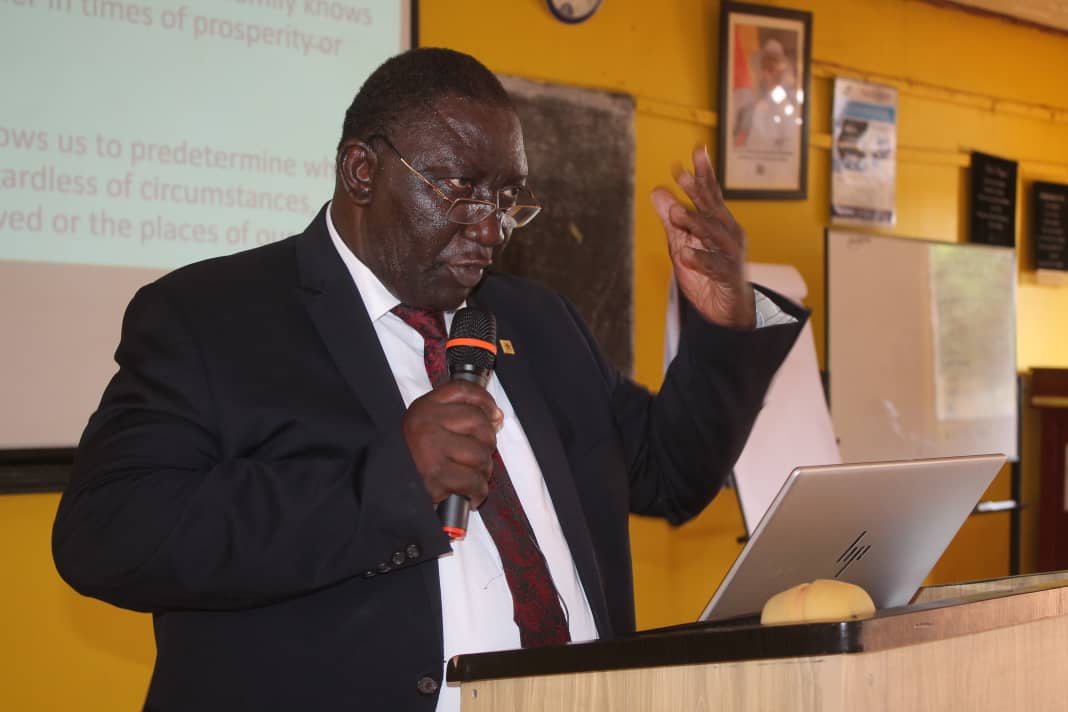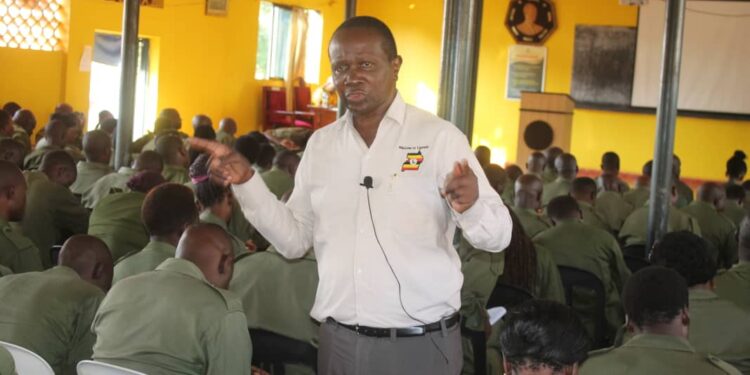The former Minister of Lands, Housing and Urban Development, Hon. Daudi Migereko has highlighted the crucial role of teamwork among officials in the Office of the Resident District Commissioner (RDC).
He says teamwork is key among the officials if they are to effectively fulfil their mandate.
“As the RDC, Deputy RDC and Assistant RDC, you are supposed to work as a team. You cannot succeed alone as an individual, you must work as a team particularly on security matters,” he said.
Hon. Migereko made the assertion today while addressing the recently appointed Assistant Resident District Commissioners (ARDCs) and Assistant Resident City Commissioners (ARDCs) who are undergoing a two-week induction training at the National Leadership Institute (NALI), Kyankwanzi.
He also advised the Assistant RDCs/RCCs to portray the good image of the President because they are his representatives in their areas of jurisdiction.
“As people who are representing the President, there are certain things you are supposed to exhibit in order to successfully carry out your work. You are representing the President and Fountain of Honour wherever you are. Can you convince anyone that you are representing the President when your personality is doubtable?” the former Minister of Energy wondered.
“The personality that you put out is the most important tool of mobilisation, appearance is very critical. If the people that you are supposed to be serving start wondering whether they sent them the right person or not, you have already lost it. Everyday find out that you are at your best. Our President is known to be sober every day, that is what you are expected to be. The office you have taken up does not give you any room to be drunk,” he added.
Hon. Migereko further tipped the commissioners to be good communicators and knowledgeable in order to deal with the problems affecting the ordinary people.
“You are supposed to be knowledgeable; you cannot mobilise others when you have gaps in terms of your knowledge and reasoning; you must be factually correct when communicating anything, whatever you are communicating must make sense,” he said.
“You must be in full knowledge of current affairs. That means whenever you wake up in the morning, you must know what is happening in the country through reading the newspaper, listening to the radio and watching TV. In your work, you are not supposed to be guessing. Once people know that that person has his facts all the time, and is good at guiding, you will not have any problem in the area.”
On the other hand, he urged the participants to interest themselves in the matters of peace and security since it is the first area of mobilisation.
“If you have no peace and security then you will have to come up with a program to deal with that problem. The master card that NRM holds is peace and security. Everybody says that if you want peace and security, you vote for NRM. People have worked day and night to ensure peace and security in your area and now you have joined that team. It is your responsibility to ensure tranquillity in your area. You are in charge of peace and security as a team in the Office of the RDC,” Hon. Migereko noted.
“If you receive a security report, handle it instantly because we are talking about the lives of the people in your area.”
Hon. Migereko also informed the Assistant RDCs and RCCs to empower the local people economically through mobilisation and sensitization.
“You can have peace and security in your area, but if people are poor without money to feed, take children to school, then they will develop wrong ideas about people’s property thus introducing criminality in the area. Government has put in place programs such as Parish Development Model and Emyooga so you are supposed to mobilise people to embrace them,” he said.
“Make use of the media to deliver the government message. If you are shy and afraid to go to media houses, then you are in the wrong office because you are supposed to appear in every public event in your area of jurisdiction.”
Hon. Migereko advised the Commissioners to ensure that they possess vital documents like the constitution of Uganda, NRM Manifesto, Local Government Act, Land Act, among others to guide them during their mobilisation journey.
“Read and understand them before going out to mobilise the masses. The moment people find gaps in your words when you are mobilising, you are in trouble. That will get you into problems and you will never be able to recover,” he said.
The Permanent Secretary- Directorate of Ethics and Integrity, Mr. Alex B. Okello emphasised that like any other public servant, the Assistant RDCs and RCCs need ethics and integrity in order to fit in the office and succeed in their work.

“The Office you have been appointed to is the highest office in the district which means it carries with it the highest responsibility; you are the President’s representative in the district. It requires having certain qualities and working tirelessly; you need ethics and integrity in order to fit in your office and succeed in your work,” Mr. Okello said.
He described ethics as a set of principles that are intended to control behaviour to a generally acceptable standard or a degree below which society will not accept whereas integrity is the state of being complete, unified and telling the truth.
“What has gone wrong in the society of Uganda is that we have lost those things we cherish and those are values. We no longer respect humanity and the environment. The work of ethics and integrity is to make us as Ugandans stand on a firm foundation of values,” Mr. Okello said.
“A person with integrity does not have divided loyalties. People with integrity have nothing to hide and nothing to fear. When integrity is the referee, we become consistent; our beliefs will be mirrored by our conduct and to succeed as a leader, you must have trust.”
Dr. Daniel Byamukama, Head of HIV Prevention, Uganda AIDS Commission (UAC) they should promote the Presidential Fast-track Initiative to end AIDS as a public health threat by 2030 by engaging men in HIV prevention and close the gap on the new infections particularly among adolescent girls and young women.
“We have more than 1.4 million people living with HIV in Uganda. We also get 52,000 infections per year and the government pays Shs800,000 to keep a person with HIV/AIDS on treatment annually. For that we need to encourage people to prevent getting infected,” he said.
“Mobilise communities to ensure everyone plays their part to ensure the country does not default on the Presidential Initiative’s commitment.”
He also noted that HIV prevalence is highest among widowed, divorced and separated and lowest among the never married.
“Prevalence reduces with education attainment and prevalence increases linearly with attainment of wealth among women,” Dr. Byamukama stressed.
Do you have a story in your community or an opinion to share with us: Email us at editorial@watchdoguganda.com










